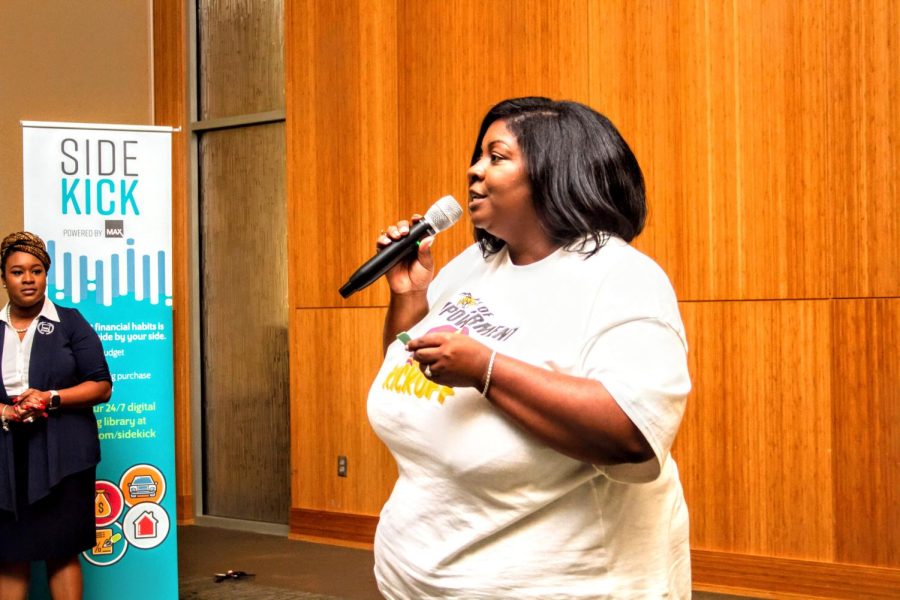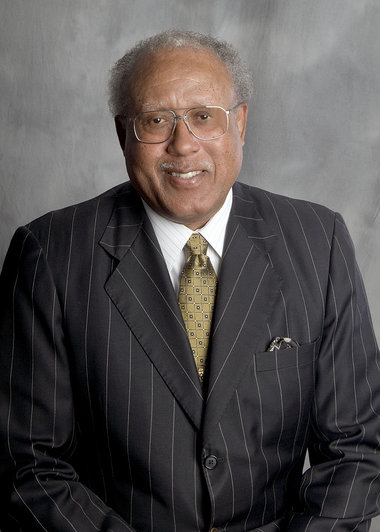Career Services introduces financial skill building empowerment program
September 24, 2022
The Alabama State University Office of Career Services kicked off the semester by introducing students to the Center for Financial Advancement (CFA), an eight-month financial skill building and homeownership empowerment program centered at selected Historically Black Colleges and Universities (HBCUs) on Aug. 22, in the Ballroom of the John Garrick Hardy Center.
Guest speakers included Regions Bank’s branch managers Robert Hough, Stacey Davis Thompson and Ashantey Green.
Director of Career Services Sabrina Crowder said CFA is created to be a “pay-for-performance initiative,” which means students earn as they learn.
“The tenants of financial wellness, professional development and essential skills sustained by access to internships and careers in the mortgage and real estate finance industry,” she said. “The amount of money earned in the program is determined by the number of points earned on the CFA program scorecard. Each assignment/activity in the program is attached to points on that scorecard.”
The benefits of the program are to help students develop leadership skills and a professional mindset. It enhances the student’s communication and networking skills via interactive online meetings and events with peers and corporate partners.
“It improves your interviewing skills, which you know is very vital to your career professional development through peer-to-peer development and mock interviews,” she said. “It also provides access to internships and career opportunities within the mortgage and real estate finance industry. There will be training seminars and certification opportunities provided by industry leaders in credit and financial wellness strategies. Access to the HomeFree USA services and partners will be granted to you.”
All undergraduate students can apply to become a CFA scholar. Students may send their resumes to [email protected] for review, and they will receive their resumes back along with a CFA application link to apply. Only 20 students may be selected to be a CFA scholar, and they will be notified by email if they are selected.
The agenda for the event is to inform students on how to manage their money, how to use credit wisely and how to help avoid identity theft and fraud.
Hough, the branch manager at Regions Bank on Adams Avenue, educates the students on the basics of credit.
“Credit is the ability to borrow money,” he said. “When you borrow money on credit, you get a loan. You make a promise to pay back the money you borrowed plus interest, which is the additional amount that is charged based on the percentage of money that you borrow from the lender.”
According to Hough, credit gives you the power to make large purchases such as cars and houses.
“Having good credit means that you have established a good history of making payments or loan payments on time and repaying the money that you owe,” he said. “If you have good credit, it will be easier to borrow money in the future. If you have problems with using credit responsibly and making your payments late, it will be harder to obtain credit in the future.”
Hough talks about the “four C’s of credit,” which are capability, capital, collateral and character. Capability is the ability to make payments, capital is the value of assets and net worth, collateral is property and assets used to secure loans and character is if someone has paid their bills or debts in the past.
Davis, the branch manager at Regions Bank on Taylor Road, informed students on how to track their spending.
“Track your spending beginning with the income and follow through with all of your expenses,” she said. “It’s common for people to spend money that they may not have anything left over for their goals. In fact, many people say they do not have anything to show for their hard work at the end of the month”
According to Davis, to be in control of your money you must understand your cash flow and determine your monthly income and expenses.
“Cash flow is about the money you earn, spend and save. To create a snapshot of your cash flow, keep a personalized spending diary over a period of time,” she said. “Income is money that comes to you from wages, allowances, and other sources such as scholarships and grants.”
“Gross income is your total income without deductions,” she said. “Net income is the cash you bring home after your employer deducts your taxes, social security, health insurance, 401(k) and so on.”
Green, the branch manager at Regions Bank on Village West, educated the students on identity theft and what they should do to avoid it.
“Identity theft occurs when thieves steal your personal information such as your social security number, your birthday or credit card numbers,” she said. “With sufficient information, another person can become and use your identity to commit fraud or other crimes.”
Green wants the students to consider how it will be different if they were contacted via social media, work, school, or perhaps in person by people around their age who look like them and their friends.
“Someone who approaches you may look harmless or even have others with them to vouch for them,” she said. “The offer will often sound like a great deal with very little effort needed on your part. It may be presented as a request for help or favor or they may pretend to be in need to prey on your sympathy. Do not allow others to deposit checks into your checking account and never open a new account or get a new debit card at someone else’s request.”

















